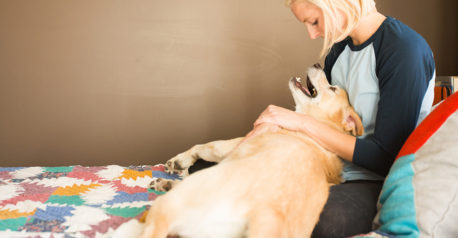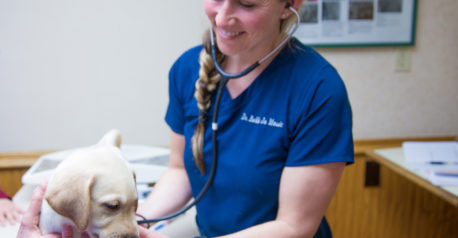Puppies and Kittens
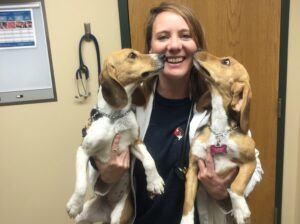 Bringing new puppies or kittens home is one of the greatest joys in life. At the Animal Clinic of Billings, our vets know what an exciting time this is, and we want to help you start your new life together in the best and healthiest way possible. During your puppy or kitten’s first vet visit, one of our vets will conduct a complete wellness exam, administer de-worming medication, update all necessary vaccines, and spend time educating you on all of your new pet’s health needs. Expect your first consultation with us to last about an hour, and bring everyone in the family who will be involved in caring for your new furry family member.
Bringing new puppies or kittens home is one of the greatest joys in life. At the Animal Clinic of Billings, our vets know what an exciting time this is, and we want to help you start your new life together in the best and healthiest way possible. During your puppy or kitten’s first vet visit, one of our vets will conduct a complete wellness exam, administer de-worming medication, update all necessary vaccines, and spend time educating you on all of your new pet’s health needs. Expect your first consultation with us to last about an hour, and bring everyone in the family who will be involved in caring for your new furry family member.
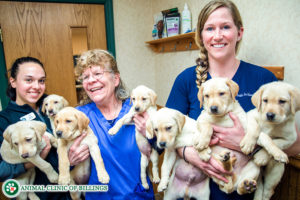
By bringing your new puppy or kitten in for appointments at 2, 3, and 4 months of age, you will be, “getting them off on the right paw” for healthy growth and development, and establishing a relationship that will promote a lifetime of health and wellness.
KITTEN CARE
Adopting a new kitten is an exciting event filled with joy and laughter. Kittens are playful, entertaining little scamps who require care and plenty of hands-on attention from their human family members. You can support your kitten’s healthy development in many ways. Introduce them to their new family, familiarize them with their new environment, and pay attention to their physical well being. The Animal Clinic of Billings loves kittens and the staff’s combined clinical experience guarantees you will be well informed about your kitten’s needs.
Here are essential tips on caring for a kitten in the first six months:
UNDER 4 WEEKS
Newborn kittens (0-4 weeks) are developing coordination and motor skills. They are also working to balance their body temperature. Young kittens depend primarily on nutrition and warmth from the momma cat. If, however, the mother is still with the kittens, there is not much for human caregivers to do.
If, however, the mother cat cannot care for the kittens, a lot of human care is necessary to help the them grow and thrive. We recommend you bring newborn kittens to the Animal Clinic of Billings shortly after they are born. It is crucial to have a veterinarian assess the kittens’ condition focusing mainly on feeding and developmental progress. This includes bottle feeding the kittens every 2-4 hours, keeping their environment warm and safe.
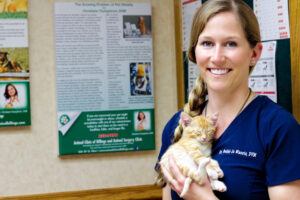 Once you return home with the kittens, keep them warm and cozy with blankets – especially if they are separated from their mother and/or other kittens. You can hold the kittens during this time, but be extra gentle, as their bones are still forming.
Once you return home with the kittens, keep them warm and cozy with blankets – especially if they are separated from their mother and/or other kittens. You can hold the kittens during this time, but be extra gentle, as their bones are still forming.
5-11 WEEKS
By this time, young kittens should be weaned and feeding on a high protein, energy-dense diet. Your kitten’s motor skills and coordination should also be progressing. This is the age where your kitten will become a fireball of activity. Proper supervision will ensure your kitten’s newfound sense of adventure and bravado doesn’t lead your kitty into dangerous situations.
2-4 MONTHS
This is a time of rapid growth and development for your new kitten. Expect your kitten to have more energy than an adult cat and be prepared to be awakened at night by a kitten who is ready to play. Caring for a kitten during this phase includes plenty of bonding-based playtime and feeding the kitten 3 or 4 high protein meals per day.
4-6 MONTHS
At this age of adolescents, kittens will reach, sexual maturity, resulting in an increase in energy. At times, your kitty’s behavioral changes will resemble that of a human teen entering puberty. Caring for your kitten during this phase includes hands-on bonding-based playtime. If your kitten is an indoor cat, enriching the kitty’s environment is extremely important. Talk to your veterinarian about ways to create an enhanced environment that provides the right amount of stimulation instinctively desired by cats.
At the six-month mark, plan for your kitten to be spayed or neutered. Most kittens experience puberty at 6-8 months, and it is recommended they are spayed or neutered just before then to avoid unwanted kittens.
NUTRITION TIPS FOR KITTENS
Proper kitten nutrition during this stage of growth is essential for happy, healthy, and thriving cats. Our veterinary staff is glad to discuss the proper feeding schedule for your kitten at your next veterinary appointment.
The mother cat should be feeding her kittens during the first four weeks of life. If the kitten is separated from its mother, use a special commercial milk-replacer formula and feed every 2-4 hours.
- From 3-5 weeks of age, kittens should be fed a milk-replacer formula in a shallow dish to encourage weaning. Add a moist, chewable diet of a warm milk-replacer and high quality canned or dried kitten food 4-6 times a day.
- At 5-8 weeks old, your kitten should be chewing food, and you should provide a protein-rich and energy-filled diet, with feedings occurring 3-4 times daily.
- There are a variety of kitten foods available, which you can discuss at your next veterinary appointment. Our veterinarians recommend canned food because it will mimic the natural diet both in consistency and formulation. However, a proper diet may also consist of a combination of canned and dry cat foods.
- After 6 months of age, feed your kitten 2-3 times a day.
SOCIALIZING YOUR KITTEN
Socializing is a significant part of a kitten’s development and applies to both human family members and any other pets in your household. Most dogs get along famously with cats. However, certain dogs possess a strong prey instinct and cannot decipher a cat from a rabbit. Proper interaction and overall behavior require hands-on, responsible, and sustained social development, including the following:
- Litter box training
- Regular petting and cuddling
- Toy introduction
- Exploration with boxes, paper bags.
- Rewarding good behavior with cat treats
- Time outs for bad behavior
- Diversions from biting and scratching
- Meeting new people and animals in a controlled environment
- Weekly grooming and combing
- Monitored outdoor adventures (once kitten vaccinations have begun).
WHAT CAN GO WRONG WITH KITTENS
Newborn kittens, age 0 to four weeks, are a lot of work, and it is vital to know what can go wrong. Warning signs include:
- Lack of appetite, especially for abandoned newborn kittens
- Motor skills and coordination difficulties
- Lethargy, diarrhea or vomiting
You can stop monitoring your kitten’s feeding habits and body temperature at four weeks old but continue watching for warning signs and behavioral issues. Contact your veterinarian if you have concerns on any topics listed below:
- Litter box use
- Aggression and biting
- Fears and other behaviors that need to be addressed while your kitten is still impressionable
Should you observe odd or concerning behavior in your kitten, please bring her in for a visit with the veterinarian.
YOUR KITTEN’S FIRST VETERINARY APPOINTMENT
Schedule an exam for your kitten within the first week of adoption. Early and frequent visits help socialize your kitten and allows the veterinarian to establish an informed baseline of your kitten’s health and wellness. You can expect a thorough physical exam to uncover any health issues. The veterinarian will also check for birth defects (hernias, cleft palate, and heart defects) or infectious diseases and makes a plan to address any health issues. Preventive care provides your kitten with the best opportunity to live a healthy life. Finding the right veterinarian that works for you is your best choice. Your veterinarian should administer wellness checkups, kitten vaccinations, and create a preventive maintenance schedule to ensure a happy and healthy cat. Our experienced veterinarians notice subtle signs that something may not be quite right with your kitten. We love educating our clients about the best methods of recognizing and preventing worms, parasites, illnesses, and diseases in kittens.
INTESTINAL PARASITES, FLEAS, AND HEARTWORM IN KITTENS
All kittens require a regular deworming program to kill most intestinal parasites. Your kitten’s stool also will be checked for more uncommon parasites. Also, cats may contract heartworms, for which there is no treatment. We strongly urge heartworm prevention for all cat patients.
Fleas are one of the most common parasitic dangers to kittens. Providing your veterinarian with a history of your kitty’s lifestyle and administering proper flea and tick control are essential components of kitten care. We do not recommend over-the-counter sprays, powders, and collars to treat parasites. They are not as effective as prescription products and may be toxic to kittens. We are happy to discuss effective flea, tick, and parasite prevention with you at your next appointment.
SCHEDULE FOR KITTEN VACCINATIONS
Kitten vaccinations are crucial to proper kitten care and should begin shortly after you get your kitten. We recommend vaccines begin for kittens at 6 weeks of age, followed by booster shots every 3 – 4 weeks and ending booster shots at 16 – 20 weeks. Kitten vaccinations prevent feline leukemia, rabies, and distemper. These infectious diseases are devastating and preventable with vaccinations. We will work with you to establish a long-term plan for the rest of the cat’s adult life.
WHEN SHOULD YOU SPAY OR NEUTER YOUR CAT?
Do you have a kitten that is in contact with other kittens or cats of the opposite sex? If so, it is essential you have them spayed or neutered as they reach 5-6 months of age. Three important reasons for spaying and neutering include avoiding unpleasant habits such as territorial scent spraying; preventing unplanned litters; and minimizing the chance of mammary or testicular cancer later in life.
PUPPY CARE
LONG-TERM HEALTH STARTS WITH REGULAR VETERINARY CARE
The time you commit to your new puppy during their first few months will have a significant impact on the quality of your relationship throughout the rest of their life. Establishing a relationship with a veterinarian during these formative months is one of the most important steps you can take towards giving your new family member the healthiest and happiest start in life.
There are several important reasons to schedule a pediatric visit as soon as you acquire your new puppy or kitten. First, a thorough physical exam will reveal if any health issues are present. If any congenital abnormalities (such as hernias, cleft palates, and heart defects) or infectious diseases (such as upper respiratory infections) are present, your vet will make a plan to address them. Also, oral de-worming medication is administered.
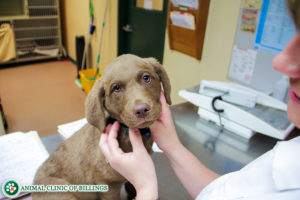
“Because essentially all puppies and kittens get intestinal parasites from their mothers, we always give multiple doses of de-worming medication over the first few visits, then check a fecal sample to confirm that no parasites remain,” explains Dr. Youngstrom, associate veterinarian at the Animal Clinic of Billings.
This is also the perfect opportunity to gather vital puppy care information you will need to be a responsible, well-informed, and loving pet parent to your new puppy. Expect your first puppy care consultation with us to last about an hour, and bring everyone in the family who will be involved in caring for your new furry family member.
SCHEDULE PUPPY VACCINATIONS
Dr. Youngstrom explains that another important reason to get your new family member in for a pediatric appointment is to start their vaccine series.
“Puppy vaccinations will be needed every 3-4 weeks until your puppy reaches 16 weeks of age. Booster immunizations will be required periodically after that throughout adulthood.”
“Vaccination is crucial for puppies and kittens because their immune systems are not yet fully formed, which makes them more vulnerable to infectious diseases than adult animals. Antibodies from their mothers’ milk help to protect them up until they are about six weeks old, but after that, they need vaccines to reduce their risk of catching serious diseases.”
All puppies need the DHLPP combo vaccine at 8, 12, and 16 weeks of age, as well as the rabies vaccine at 12 weeks old. The Bordetella vaccine, which protects against one of the causes of kennel cough, is also recommended.
All kittens need the FVRCP combo vaccine at 8, 12, and 16 weeks of age and the rabies vaccine at 12 weeks old. Kittens that will not be kept exclusively indoors also need the FeLV (feline leukemia virus) vaccine at 12 and 16 weeks old.
QUALITY PUPPY FOOD MAKES A BIG DIFFERENCE
Choosing the right puppy food is an integral component of responsible puppy care. Early on, your puppy’s body is growing incredibly fast and in ways that will directly impact their quality of life for many years to come. This is why it’s so crucial that you choose a puppy food that meets your puppy’s nutritional needs during this rapid growth phase. A statement from the Association of American Feed Control Officials (AAFCO) should always be listed on the bag of puppy food you chose. This will ensure the puppy food meets or exceeds nutritional requirements for young developing canine bodies.
After reaching nine to twelve months of age, smaller and medium-sized dogs can start to be weaned off of their puppy food and gradually transitioned to a dog food formulated for adult canines.
Large and giant breed dogs, however, should be fed a puppy food formulated specifically for large and giant breed puppies until they are 12 to 18 months of age.
Water is crucial for young developing canines so make sure your puppy always has plenty of fresh water available. A consistent feeding and walking schedule will help tremendously with potty training. Puppies are put at ease by having a predictable routine, and this allows them to learn more quickly.An ideal puppy feeding schedule to follow would be:
- 6-16 weeks: 3-4 meals per day (4 meals per day should only apply to small dog breeds)
- 3-6 months: 2-3 meals per day
- 6-12 months: 2 meals per day
A puppy should always be taken outside and given an opportunity to go to the bathroom shortly after finishing a meal.
AVOID FEEDING YOUR PUPPY HUMAN FOOD
We strongly recommended that you refrain from feeding your puppy human food from your plate. Puppies quickly develop persistent begging behaviors if given table scraps even a few times, and this will become much more problematic as your puppy grows into a full size adult dog. Even though feeding them small amounts of human food might not necessarily be dangerous for your puppy, the troublesome behavior that results from it can often be a tough habit to break, and can interfere with your relationship.
Instilling clearly-defined food boundaries and rules early in life is vital to training a well-behaved dog for the future. This may require crating or confining your puppy away from the dining area until they learns how to behave while you’re eating.
POTTY TRAINING STARTS WITH A GOOD BATHROOM ROUTINE
Potty training should begin as soon as you bring your new puppy home. At first, the easiest way to start potty training is to take your puppy outside as much as possible—every hour if possible. Direct your puppy to a designated area where you want them to go, and consistently use that spot for potty training. When your puppy goes in the designated area, immediately shower them with rewards and praise. Reserving their favorite kind of treats just for this purpose will create a strong positive association, reinforcing the desired bathroom behavior.
Remember, your puppy doesn’t go to the bathroom in the house on purpose, they go because they still don’t know any better. Puppy potty training requires patience, planning, and plenty of positive reinforcement. Punishment won’t help when accidents happen (and we promise you, they will happen!).
Punishment induces fear, which directly interferes with the learning pathways in the brain. As such, it can be directly counterproductive, and can even result in your puppy attempting to eliminate in hidden locations. Instead, the best and fastest way to achieve potty training is by establishing trust and security with your puppy using positive reinforcement with consistency and excellent timing.
UNDERSTANDING HOW TO DEAL WITH PUPPY TEETHING
Puppy teething is an unavoidable and sometimes painful part of having a puppy. Although puppy teething is a natural part of healthy development in dogs, it can also lead to habits that can quickly become problematic and out of hand. When it comes to teething, it’s essential that you provide the proper outlets for your puppy to work through this phase in order to minimize destruction and painful bites.
Puppies are born without teeth. A puppy’s baby teeth will begin to appear around three weeks of age. By the time your puppy reaches six to eight weeks of age, he or she will have a full set of 28 baby teeth. By the time they reach 4 months of age (16 weeks), they begin to lose their baby teeth, and adult teeth erupt to take their place. Teething behavior occurs due to the discomfort caused by this rapid growth process. It’s important to remember that your puppy will need things to gnaw on to relieve the discomfort caused by his or her fast growing teeth.
Age-appropriate teething toys are essential for puppies during this time. It is also important to reinforce that nipping or biting people, property, and other animals is not okay.
CRATE TRAINING PUPPIES
The practice of confining a puppy to a small area or spacious crate is a standard training method used to prevent puppies from soiling inside the house or getting into trouble when you’re not home. When crate-training a puppy, it is important to select a crate that will be large enough for the puppy to comfortably stand up and turn around as they grow larger. The crate should be located in a quiet area, and furnished with a comfortable bed and toys.
Initially, the puppy should be left alone in their crate for only a very brief period of time, with plenty of toys and treats to make the crate a fun place for the puppy. Gradually the amount of time spent in their crate can be extended as long as the puppy does not show signs of stress. Learning to remain calm and relaxed when alone is very important in order to decrease the risk of separation anxiety developing in the future. Crating should be used in conjunction with a consistent meal and bathroom schedule to maximize potty training success.
PUPPY TRAINING CLASSES
Once your puppy begins their vaccination series, he or she is ready to start puppy class with other vaccinated puppies. We recommend that you start puppy classes at 7-8 weeks. This is a key first step in the socialization process that supports healthy mental and emotional development. Upon graduating from the puppy classes, we recommend that they continue through to the next stage of basic dog training.
SOCIALIZING YOUR PUPPY
One of the most important aspects of puppy care is to begin socializing early on. In puppy development, there is a window between 4 and 16 weeks of age when a puppy will readily accept new conditions and experiences that will then be comfortable to the dog for the rest of their life.
Anything they encounter for the first time after this developmental period may be regarded with fear or aggression that does not diminish with repeated experiences. Therefore, it is essential during this period to expose a puppy in a controlled manner to as many things as possible that they may encounter later in their life, including people (well-behaved children, handicapped people, people with different styles of dress, etc.), other animals (friendly dogs, cats, horses, etc.), objects, noises, etc.
One invaluable tool for puppy socialization is puppy kindergarten classes. A puppy should start these classes at seven to eight weeks old. This is a critical time for your puppy where they should be exposed to safe and varied experiences with a variety of people and healthy vaccinated dogs in order to develop normal social skills. Dogs that lack adequate social skills are much more likely to be fearful or aggressive towards unfamiliar people, animals, and experiences.
Well-socialized dogs also live much happier lives than dogs who are constantly stressed out by their environments as a result of inadequate social development as puppies. Puppies who learn to relax around loud noises, cats, veterinary examinations, crowds, and other potential stressors are safer to live with than dogs who find these situations threatening.
During your puppy’s first visits to the Animal Clinic of Billings, one of our veterinarians will help you identify any problematic behaviors and advise you on how to deter your puppy from developing any bad habits. At this time, we will help you with any concerns you might have, and provide the appropriate solutions so everyone in your family can work together at home to encourage positive puppy behavior.
HOW TO TELL WHEN PUPPIES ARE SICK
Young puppies are highly prone to contracting illnesses that can be very serious, but most of these are preventable. In addition to vital puppy vaccinations, the key to maintaining your puppy’s health is diligently monitoring your puppy’s behavior for signs of illness as they mature.
If any of the following symptoms appear in your puppy, contact your vet immediately:
- Loss of appetite
- Lack of weight gain
- Vomiting
- Swollen or painful chest or abdomen
- Lethargy (tiredness)
- Diarrhea
- Difficulty breathing
- Wheezing or coughing
- Pale gums
- Swollen, red eyes or eye discharge
- Nasal discharge
- Inability to pass urine or stool
WHEN SHOULD YOU SPAY OR NEUTER YOUR DOG?
We recommend spaying or neutering dogs at around 6 months of age. One of our veterinarians will discuss all of your options for this procedure with you and identify if your puppy’s breed calls for any alternate actions.
The American Veterinary Medical Association recommends early spaying and neutering in dogs both for its health benefits and to reduce the risk of unintended litters. It has been shown that a female spayed before her first heat (which typically occurs between 6 and 9 months of age) will have a dramatically decreased risk of developing mammary cancer later in life. Because about 50% of mammary cancers are malignant and ultimately life-threatening, anything that can be done to reduce this risk is essential to a female dog’s well-being.
In addition, spaying a female dog eliminates the risk of a life-threatening uterine infection and cancers of the reproductive tract. In males, neutering eliminates the risk of testicular cancer, and decreases the incidence of undesirable male behaviors. Many people are not aware that a female dog can become pregnant as early as their first heat cycle, at 6-9 months of age, and that male dogs can father a litter when they are as young as 7-8 months old.
There’s nothing greater than a puppy, but currently, there are far too many who end up in shelter situations and get euthanized due to unchecked populations.
For more information on our discounted spay and neuter services for dogs and puppies, please visit our Affordable Spay and Neuter page.
ANIMAL CLINIC OF BILLINGS AND ANIMAL SURGERY CLINIC
providing our region’s companion animals and their families what they need and deserve since 1981
1414 10th St. West, Billings MT 59102
406-252-9499


